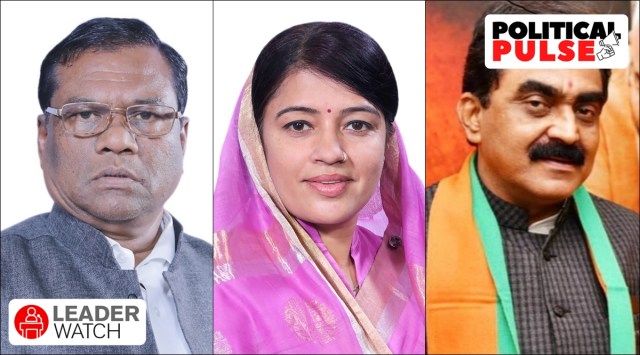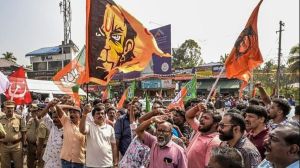Poll countdown begins: The heavyweights from Centre in BJP’s MP list
Long-time MPs, first-time MLA contestant in BJP's bid to hold on to Vindhya Pradesh, wrest back Mahakoshal region
 BJP leader Kailash Vijayvargiya, among those leaders to have been returned to state politics by the party after a long time, had said one reason for the party's move was that none of them had ever lost an election.
BJP leader Kailash Vijayvargiya, among those leaders to have been returned to state politics by the party after a long time, had said one reason for the party's move was that none of them had ever lost an election. IN its second list of 39 candidates for the Madhya Pradesh Assembly elections, the BJP had stunned by naming several big names from the Centre.
BJP leader Kailash Vijayvargiya, among those leaders to have been returned to state politics by the party after a long time, had said one reason for the party’s move was that none of them had ever lost an election.
What the BJP’s move also did was ostensibly throw open the party’s choice for chief minister should it win. The party has been wary of going in with sitting CM Shivraj Singh Chouhan as its face, due to the fatigue factor associated with his nearly 20 years in the post.
A look at the prominent Central leaders now in the race for the state:
Faggan Singh Kulaste
In a state where tribals form over 21% of the population, Union Minister of State Kulaste, among the heavyweights dropped into state election race from the Centre by the BJP, is the party’s big tribal face.
The 64-year-old Mandla MP, who is Union MoS, Rural Development and Steel, replaces younger brother Rampyare in the Niwas seat. Rampyare had won the seat twice, before losing to the Congress’s Ashok Marsokle in 2018.
An MLA from 1990 to 1992 (the BJP government was dismissed after two years as President’s rule was imposed in the aftermath of the Babri Masjid demolition), Faggan Kulaste first became an MP in 1996, and has since been elected to the Lok Sabha six times. But his heft as a tribal leader of the dominant Gond community and work as a Union minister is expected to help the BJP improve its tally in the closely contested Mahakoshal region.
In the 2018 Assembly elections, the Congress had won 28 of the 46 seats in the region, while the BJP had won 17 – a reversal from 2013, when the BJP had won 29 seats and the Congress 16. The Congress had made gains in rural and tribal areas in 2018, with the BJP maintaining its hold in urban belts.
Kulaste has served as the Union Minister of State for Parliamentary Affairs, Tribal Affairs, Health and Family Welfare, and Steel in different governments at the Centre led by the BJP.
He hit national headlines when his name figured among the BJP MPs who were allegedly offered money to help the government of Manmohan Singh survive a no-confidence motion in July 2008.
Riti Pathak
The MP from Sidhi, Pathak has her task cut out as the BJP fights the fallout of a man linked to its sitting Sidhi MLA, Kedarnath Shukla, captured on video urinating on a tribal leader. The resultant controversy had led to Chief Minister Shivraj Singh Chouhan washing the feet of the tribal man in a damage control exercise.
The BJP is hoping that the replacement of Shukla with Pathak – who won the 2019 Lok Sabha elections with a massive margin of 2.86 lakh votes — will help it keep its hold in Vindhya Pradesh. In 2018, when the BJP had fared poorly in several regions of Madhya Pradesh, Vindhya Pradesh had been an exception. Of the 30 Assembly seats in the region, the BJP had won 24, attributed to the party retaining the support of the Kol tribe and OBCs.
Apart from the tribal anger over the urination incident, which has left the Congress rejuvenated, Pathak, 46, faces simmering discontent in the Shukla camp.
Shukla earlier told The Indian Express that the ticket to Riti Pathak “shows that the party does not value its grassroots workers”, and said he would soon announce what he planned to do.
The 2019 Lok Sabha win was Pathak’s second, with her 2014 victory margin an equally impressive 1.08 lakh votes. While those victories were part of the Modi wave for the BJP in the Lok Sabha polls, it is the first time Pathak is facing an Assembly election.
A law graduate and history student, Pathak has been a member of various parliamentary committees.
Rakesh Singh
A FOUR-TIME MP from Jabalpur, which also falls in the Mahakoshal region, Singh is currently the chairman of the Parliamentary Standing Committee on Coal and Steel. He was the president of the Madhya Pradesh BJP unit from 2018 to 2020 and the chief whip of the BJP in the Lok Sabha from 2016 to 2019.
He has been tasked with taking down two-time MLA and former finance minister in the Kamal Nath-led Congress government, Tarun Bhanot, who won in 2018 by a margin of 18,683 votes.
A science graduate, Singh, 61, has been representing the Jabalpur parliamentary constituency since 2004, and won in 2019 by a huge margin of 2.08 lakh votes.
Ganesh Singh
FOUR-TIME Satna MP, Ganesh Singh, is another leader expected to consolidate the BJP base in the Vindhya Pradesh region, especially among the OBC Kurmi and Brahmin upper caste voters.
Singh, 61, started his political career in student politics, and later drifted towards the Janata Party. He ventured into elections starting from zilla panchayats and is credited with working for development of the Vindhya region at the ground level, including on health, sanitation, education, irrigation, infrastructure.
Singh contested his first Lok Sabha election in 2004, and won with a huge margin of 85,000 votes. That margin has kept increasing in the next three elections.
Singh is believed to have been picked by the BJP due to his experience and influence as a parliamentarian and a state leader.
The Congress had wrested the Satna seat from the BJP in 2018, which had won it in both 2013 and 2008.
As MP, Singh has been a member of various parliamentary committees.
Uday Pratap Singh
A THREE-TIME MP from Hoshangabad, Singh, 59, is a Rajput. He has been named by the BJP as its candidate from Gadarwara, which was won by the Congress’s Suneeta Patel by 15,363 votes in 2018.
The last time Singh won an Assembly election was in 2008 from Tendukheda, when he was a Congress candidate. He left the party in 2014, citing dissatisfaction.
Singh is popular among BJP workers for his “simple lifestyle” and accessibility. He is known to be shy of the limelight.
- 01
- 02
- 03
- 04
- 05






























